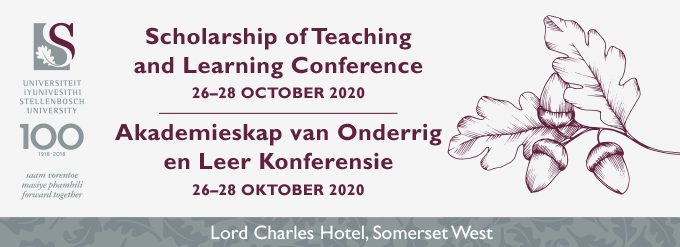Click here for the Conference abstract book!
How to submit an abstract/contribution
First you need to register as a user for this conference at https://www.conftool.pro/sotl2020/index.php?page=index then do the following:
- Log in at the above address using the access details created during the registration process.
- Click on Your Submissions.
- Choose either Research or Innovation or Reflection
- Complete the necessary fields.
- Click on Proceed and Complete submission. Then a screen will appear showing the new submission created with the details. You will also receive an e-mail confirming your submission.
GENERAL INFORMATION
In a first ever for SU, the SoTL Conference is going virtual! The 2020 SU SoTL virtual conference offers a space for academics to reflect, showcase, and share innovative practices stemming from the current unique circumstances they are teaching in (i.e. teaching remotely due to COVID-19).
Stellenbosch University staff members are invited to submit abstracts/contributions through which they reflect on the COVID-19 period, share what they have learnt and how it will impact their future teaching.
You may want to share your experiences of trying out something new or innovative in your teaching or assessment practice. Did it work or not? Perhaps you’ve conducted a large-scale needs analysis related to your teaching, or you’ve discovered something interesting while analysing the results of your students’ assessment. Have you explored a teaching-related aspect in collaboration with other colleagues in your department or faculty, or even across disciplinary boundaries? Have you conducted research on your teaching or assessment? Or perhaps you have some new ideas that you would like to discuss.
Come and share your results, innovative practices and reflections with us in a presentation or, so that we can all learn together and make teaching and learning at SU the best it can be.
You can submit abstracts/contributions in the research, innovation or reflection tracks. For the reflection track you do not need to submit an abstract, only an overview of what you would like to share. Please see the details below.
WRITING THE ABSTRACT (only applicable to Research and Innovation Tracks)
Have a look at Creating a research space (the CARS model), which provides an overview of steps to follow when doing educational research – this could assist you in writing your abstract. You may also contact the CTL Advisor in your faculty for assistance.
The abstract should consist of 300 words minimum and 350 words maximum. The deadline for submitting abstracts is 30 September 2020.
STREAMS
Abstracts may be submitted in the following streams:
- Academic and digital literacies
- Co-curriculum
- Educational Leadership
- Emergency Remote Teaching
- Evaluation
- Feedback
- Focus on first-years
- Graduate attributes
- Innovative teaching
- Innovative assessment
- Interdisciplinary teaching
- Mentoring and tutoring
- Multilingualism
- Postgraduate teaching
- Programme review and renewal
- Reflection
- Social impact
- Social justice in teaching and learning
- Student success factors
- Student support (CARe)
- Technology in education
- Transforming the curriculum
CRITERIA FOR THE ABSTRACTS/CONTRIBUTIONS
RESEARCH |
INNOVATION |
REFLECTION |
|
|
|
|
|
|
|
|
|
|
|
|
|
|
|
|
|
|
|
|
|
Recommended reading of “Reflection“:
Find the following list for further readings:
-
- Ashwin, P., D. Boud, K. Coate, F. Hallet, E. Keane, K. Krause, B. Leibowitz, I. Maclaren, J. McArthur, V. McCune and M. Tooher. 2015. Reflective teaching in higher education. London: Bloomsbury.
- Biesta G. 2019. How Have You Been? On Existential Reflection and Thoughtful Teaching. In: Webster R., Whelen J. (Eds.), Rethinking Reflection and Ethics for Teachers. Singapore: Springer.
- Dewey, J. 1986. How we think: A restatement of the relation of reflective thinking to the educative process. In: Boydston, J. A. (Ed.), The later works of John Dewey, Volume 8: 1933. (pp. 105-352). Carbondale: Southern Illinois University Press. (Original work published 1933)
The title of the presentation must be no longer than 10 words.
GENERAL CRITERIA
- The abstract/contribution must be between 300 and 350 words.
- The abstract/contribution must be language edited before it is submitted.
- Abstracts should contain in-text references (author/date), but a reference list is not required.
- The abstract/contribution should be understandable to a broad spectrum of readers.
- The abstract/contribution must be submitted by 30 September 2020.
- This document contains information about how the SoTL prize winners are determined plus the criteria used by the judging panel.
ENQUIRIES
E-mail us at sotl@sun.ac.za
